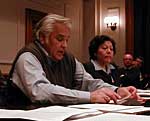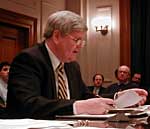A State-Run Casino?
By Laura McCallum
March 13, 2001
Part of MPR's online coverage of Session 2001
Leaders of Minnesota tribes that run casinos are urging Minnesota lawmakers to stay out of the casino business. A Senate committee took no action on a bill that would have put a state-run casino proposal on the 2002 ballot for voters to decide. Although a casino bill remains a long shot to pass this session, the issue is gaining momentum. Another bill would allow the state and Indian tribes to jointly own a Twin Cities casino and split the profits.
THE STATE AND LOCAL GOVERNMENT OPERATIONS COMMITTEE took testimony on Senate Minority Leader Dick Day's bill, which would ask voters whether the state should build and operate a casino in the Twin Cities. The Owatonna Republican says he believes Minnesotans want the state to compete with the 18 gambling houses run by Indian tribes.
"Why should one group of people have a $3 to $4 billion industry, and no competition? I don't think that's right, and I think it's right that Minnesotans, that we should have our own casino," Day told the committee.
If voters agreed, money from the state-run casino would go to building projects such as roads, bridges and recreation centers. Day says the state could get $200 million a year from a casino.
But tribal leaders say if the state gets into the casino gaming business, it will threaten some tribes' main economic tool. Audrey Kohnen, president of the Prairie Island Indian Community, which runs Treasure Island casino, says tribes are using gaming profits to overcome centuries of poverty.
"We get a little bit of income and we're trying to do something to be self-sufficient as Indian people, and it's like, 'Well, they got too much money, we gotta take it away.' I don't want to go back to where I grew up, in poverty, standing in line waiting for commodities to be fed for the month. I don't want to be dependent on the federal government for the rest of my life," Kohnen said.
The committee laid the bill over, because Day says he wants to work with the sponsor of another casino proposal likely to be introduced next week. Sen. Doug Johnson, DFL-Tower, wants the state to partner with tribes to operate a Twin Cities casino and split the profits 50-50.
Johnson says the state's two largest tribes - the Red Lake and White Earth Chippewa - support the idea, because they're not reaping the benefits of tribal gaming.
"The vast majority of Indians in Minnesota are not making much money from gaming," according to Johnson. "Both in rural Minnesota, the casinos just do not have the populations to do as well as the Twin City casinos, and also there are thousands of Native Americans living in poverty in the Twin Cities, and I want to help them as well. "
But the nine smaller tribes that make up the Minnesota Indian Gaming Association oppose any off-reservation expansion of gambling. Peter DeFoe, secretary-treasurer of the Fond du Lac Band of Chippewa, says smaller tribes object to Johnson's proposal, since tribes would split their share of the casino profits according to size.
"What it does is divide the tribes up, according to population. Like, 40 percent for White Earth, and one percent or less than that for Upper Sioux Reservation, and Fond du Lac's somewhere around six percent. And that's pitting one reservation against the other. It's a bad bill for us," DeFoe said.
DeFoe says while he doesn't think a casino bill will pass this session, he says it's only a matter of time before the state tries to tap into casino revenue.
The chairman of the House Government Operations Committee, St. Louis Park Republican Jim Rhodes, says it's not surprising that the issue is rising to the forefront.
"Money. It's just that simple," he said.
Rhodes says with hundreds of millions of dollars at stake, many lawmakers are eager to end the tribes' casino monopoly. Rhodes is a co-author of a bill to put a casino at the Twin Cities International Airport, but he says he doesn't want a vote on any casino bills this session. He plans to hold hearings around the state this summer and fall, and take another look at the matter in 2002.
By Laura McCallum
March 13, 2001
Part of MPR's online coverage of Session 2001
|
|
RealAudio |
Leaders of Minnesota tribes that run casinos are urging Minnesota lawmakers to stay out of the casino business. A Senate committee took no action on a bill that would have put a state-run casino proposal on the 2002 ballot for voters to decide. Although a casino bill remains a long shot to pass this session, the issue is gaining momentum. Another bill would allow the state and Indian tribes to jointly own a Twin Cities casino and split the profits.
| |
|
|
|
||
THE STATE AND LOCAL GOVERNMENT OPERATIONS COMMITTEE took testimony on Senate Minority Leader Dick Day's bill, which would ask voters whether the state should build and operate a casino in the Twin Cities. The Owatonna Republican says he believes Minnesotans want the state to compete with the 18 gambling houses run by Indian tribes.
"Why should one group of people have a $3 to $4 billion industry, and no competition? I don't think that's right, and I think it's right that Minnesotans, that we should have our own casino," Day told the committee.
If voters agreed, money from the state-run casino would go to building projects such as roads, bridges and recreation centers. Day says the state could get $200 million a year from a casino.
But tribal leaders say if the state gets into the casino gaming business, it will threaten some tribes' main economic tool. Audrey Kohnen, president of the Prairie Island Indian Community, which runs Treasure Island casino, says tribes are using gaming profits to overcome centuries of poverty.
"We get a little bit of income and we're trying to do something to be self-sufficient as Indian people, and it's like, 'Well, they got too much money, we gotta take it away.' I don't want to go back to where I grew up, in poverty, standing in line waiting for commodities to be fed for the month. I don't want to be dependent on the federal government for the rest of my life," Kohnen said.
The committee laid the bill over, because Day says he wants to work with the sponsor of another casino proposal likely to be introduced next week. Sen. Doug Johnson, DFL-Tower, wants the state to partner with tribes to operate a Twin Cities casino and split the profits 50-50.
Johnson says the state's two largest tribes - the Red Lake and White Earth Chippewa - support the idea, because they're not reaping the benefits of tribal gaming.
"The vast majority of Indians in Minnesota are not making much money from gaming," according to Johnson. "Both in rural Minnesota, the casinos just do not have the populations to do as well as the Twin City casinos, and also there are thousands of Native Americans living in poverty in the Twin Cities, and I want to help them as well. "
| |
|
|
|
||
"What it does is divide the tribes up, according to population. Like, 40 percent for White Earth, and one percent or less than that for Upper Sioux Reservation, and Fond du Lac's somewhere around six percent. And that's pitting one reservation against the other. It's a bad bill for us," DeFoe said.
DeFoe says while he doesn't think a casino bill will pass this session, he says it's only a matter of time before the state tries to tap into casino revenue.
The chairman of the House Government Operations Committee, St. Louis Park Republican Jim Rhodes, says it's not surprising that the issue is rising to the forefront.
"Money. It's just that simple," he said.
Rhodes says with hundreds of millions of dollars at stake, many lawmakers are eager to end the tribes' casino monopoly. Rhodes is a co-author of a bill to put a casino at the Twin Cities International Airport, but he says he doesn't want a vote on any casino bills this session. He plans to hold hearings around the state this summer and fall, and take another look at the matter in 2002.


